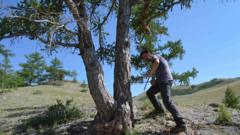🗞️Last summer hottest in 2,000 years, ancient trees reveal
🗿Semantically Similar Articles (by :title_embedding)
- 🗄️ 12.8 🔗 May23 Big Oil All Talk And No Action on Climate Change, Report Says (🧑🏻💻 asiafinancial.com)
- 🗄️ 13.2 🔗 May13 Thousands evacuate as wildfire grows ‘dramatically’ in western Canada (📰 Al Jazeera - News)
- 🗄️ 13.9 🔗 May14 Number of internally displaced people hit new record in 2023: Report (📰 Al Jazeera - News)
- 🗄️ 14.4 🔗 May13 NBA playoffs: Nuggets edge Timberwolves, Pacers thrash Knicks in game 4 (📰 Al Jazeera - News)
- 🗄️ 14.5 🔗 May14 India election: Will a 45C heatwave affect who voters choose? (📰 Al Jazeera - News)
Last summer hottest in 2,000 years, ancient trees reveal

2024-05-14
-
(from BBC Science)
Clues hidden deep in their trunks shows just how unprecedented last year's heat was.
empty
[🧠] [v1/3] title_embedding_description:
[🧠] [v1/3] summary_embedding_description:
[🧠] As per bug https://github.com/palladius/gemini-news-crawler/issues/4 we can state this article belongs to titile/summary version: v1 (like 99% of articles)
🗿article.to_s
------------------------------ Title: Last summer hottest in 2,000 years, ancient trees reveal Summary: Clues hidden deep in their trunks shows just how unprecedented last year's heat was. [content] empty [/content] PublishedDate: 2024-05-14 Category: Europe NewsPaper: BBC Science
"title"=>"Last summer hottest in 2,000 years, ancient trees reveal",
"summary"=>"Clues hidden deep in their trunks shows just how unprecedented last year's heat was.",
"content"=>"",
"author"=>nil,
"link"=>"https://www.bbc.com/news/articles/c72pp3yqzjyo",
"published_date"=>Tue, 14 May 2024 15:01:04.000000000 UTC +00:00,
"image_url"=>"https://ichef.bbci.co.uk/news/240/cpsprodpb/c1de/live/03d75b80-1200-11ef-bee9-6125e244a4cd.jpg",
"feed_url"=>"https://www.bbc.com/news/articles/c72pp3yqzjyo",
"language"=>nil,
"active"=>true,
"ricc_source"=>"feedjira::v1",
"created_at"=>Tue, 14 May 2024 16:13:32.833134000 UTC +00:00,
"updated_at"=>Wed, 09 Oct 2024 11:00:53.865684000 UTC +00:00,
"newspaper"=>"BBC Science",
"macro_region"=>"Europe"}